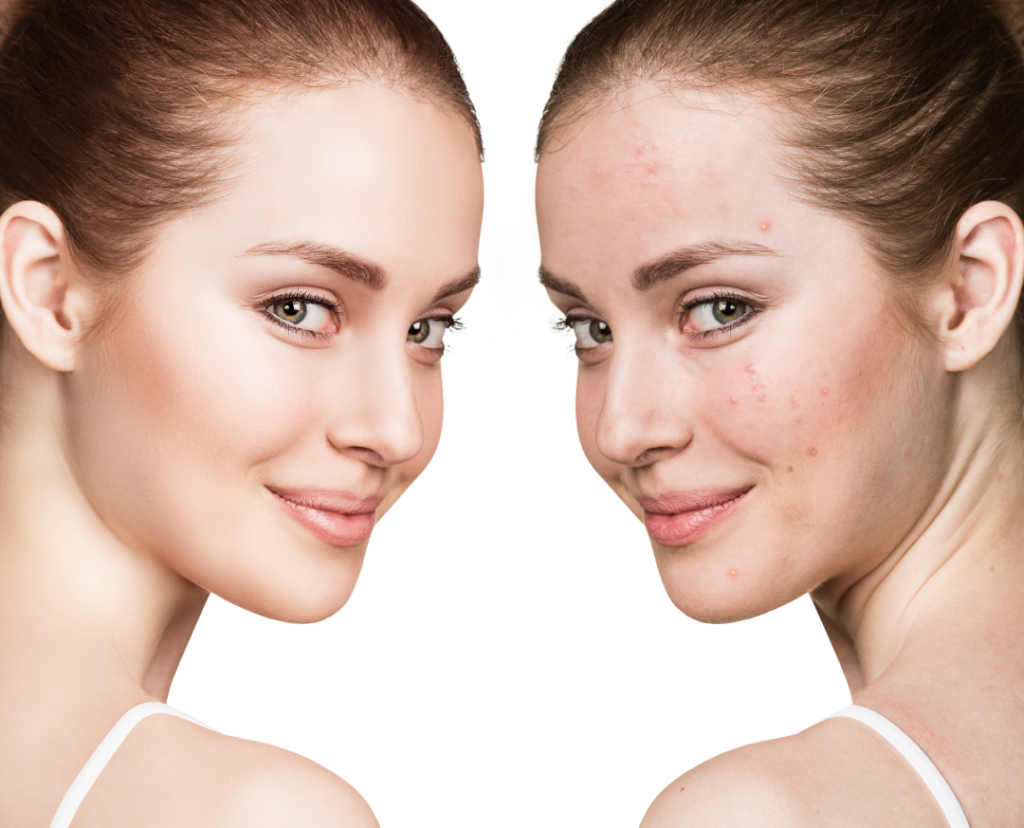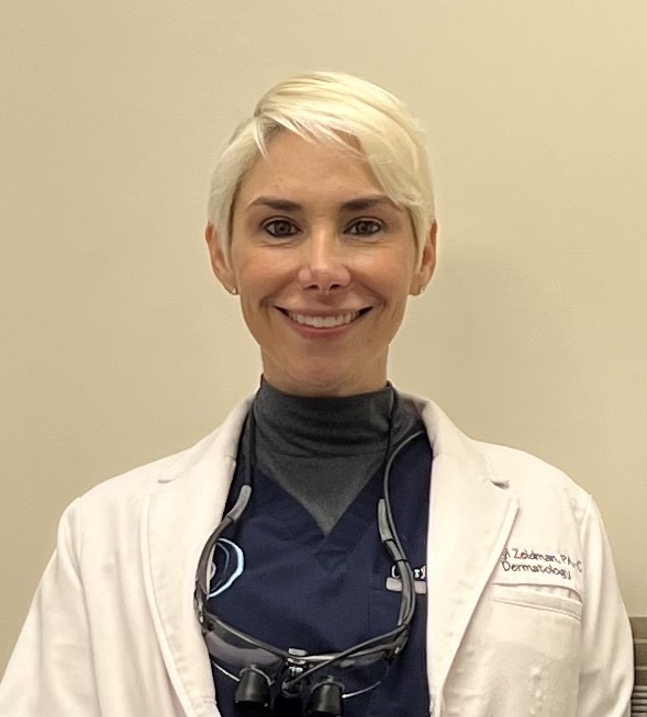
June is Acne Awareness Month
Acne Awareness Matters
June is National Acne Awareness Month, so what better time to bring to light this incredibly common, yet sometimes overlooked skin condition? Often dismissed as “pimples,” acne can be mild, with few or no symptoms, or so severe that it causes scars on the skin.
In fact, acne is the most common skin condition in the United States, and affects 80% of young adults. Over time, it can have a detrimental effect on your self-esteem, social life, mental health, and overall well-being and has even been linked to depression, social dysfunction, and suicidal thoughts.
Acne 101
Acne is an inflammatory disorder of the skin that occurs when a pore is filled with enough excess oil, dead skin cells, and/or bacteria. Each pore is open to a follicle that is made up of hair and an oil-producing gland. The sebum (oil) is released from the gland to help form a greasy surface on the skin, triggering an inflammatory reaction to produce acne when:
- Too much oil is produced
- Dead skin cells gather in your pores
- Bacteria build-up occurs
Acne can be categorized into three groups:
- Persistent acne: Starts in adolescence and continues
- Late onset acne: Develops for the first time after age 25
- Relapsing acne: Acne that heals and continues attacks from young to adult age
Persistent acne is the most common type of adult acne, making up 73.2% to 82% of cases.
The Difference Between Teenage and Adult Acne
While we commonly think of acne only affecting teenagers and young adults, the reality is acne can continue into older adulthood. Over 25% of women and 12% of men in their 40s report having acne. Adolescent acne refers to patients between 10 and 19 years of age, while adult acne categorizes patients 20 and above.
Teenage acne is typically caused by an increase in hormones during puberty. Adult acne can happen for a variety of reasons. When it occurs during teenage years, it is more common in males and found on the forehead and nose, and when it continues into adulthood, it is more common in women, and occurs on the lower chin area. Acne shares different properties in adults and adolescents which extend from epidemiology to treatments.
Acne Symptoms and Causes
Part of what makes acne so difficult to deal with is how puzzling it can be. There are many different causes and types, and misinformation is being spread more and more often. Acne is most commonly found on your face, but can develop anywhere on your body including your back, chest, and shoulders.
Oftentimes, here at Waccamaw, our patients come in with a variety of symptoms, such as:
- Whiteheads: Plugged hair follicles that stay beneath the skin and produce white bumps.
- Blackheads: Plugged follicles that reach the surface of the skin and open up.
- Papules: Small, red, raised bumps that can be tender to the touch.
- Pustules: Small red pimples that have pus as their tips.
- Nodules: Painful, solid lumps lodged deep within the skin.
- Cysts: Painful, large lumps that contain pus.
Some factors may increase your risk for developing acne including:
- Hormones: An increase in androgens (male sex hormones) may increase in both boys and girls, normally during puberty. Changes related to pregnancy can also contribute to acne.
- Family history: You may be more likely to develop acne if your parents had acne.
- Medications: Certain medications that contain hormones, corticosteroids, and lithium can cause acne.
- Age: People of all ages can develop acne, but it is more common in teens and young adults.
Other elements such as diet, stress, environmental irritants, and irritation of skin do not cause acne, but can exacerbate it.
Acne affects millions of people around the world and is a source of annoyance and insecurity among adolescents and adults. Whether you are a teenager navigating the difficulties of growing up or an adult dealing with unexpected breakouts and flare-ups, knowing what to do to improve your unique acne is key.
Self Treatment
Your skin is your body’s largest organ, and is the first line of defense in keeping yourself healthy, which is why it’s vital to prioritize its health.
Walking through the store you see countless different face soaps, creams, and supplements with prices ranging from a few dollars to hundreds. So what would work for you? There is no “one size fits all” treatment for acne, so doing a thorough physical exam and full history will allow us to figure out the best course of treatment.
Whatever the cause of your acne is, self care solutions such as washing your face gently twice a day, using water based makeup rather than oil based, and wearing sunscreen, can help to improve your skin. Squeezing and scratching existing pimples, wearing tight headbands or hats, touching your face, and wearing greasy cosmetics are all things to avoid.
If your acne does not subside with self care remedies, it is time to seek a dermatologist. Different symptoms require different treatments. The best solutions to treat acne for different symptoms include:
- Whiteheads and/or blackheads
- A retinoid (cream, gel or liquid form)
- Benzoyl peroxide, azelaic acid, or salicylic acid
- Antibiotics
- Nodules and cysts
- Prescription medication and possibly an antibiotic
- Hormonal therapy
- Isotretinoin (severe acne medication)
- Pimples
- Benzoyl peroxide
- A retinoid
- Azelaic Acid
Waccamaw Dermatology Skin Institute Can Help
When you find yourself unable to control acne on your own, Waccamaw Dermatology Skin Institute is here to help.
 “We typically start by assessing the patient to determine what type of acne they have, as that will guide therapy,” notes Cheryl Zeidman, Certified Physician Assistant at Waccamaw Dermatology Skin Institute.
“We typically start by assessing the patient to determine what type of acne they have, as that will guide therapy,” notes Cheryl Zeidman, Certified Physician Assistant at Waccamaw Dermatology Skin Institute.
“I advise against scrubbing with a washcloth, picking, squeezing acne,” Zeidman notes. “Patients need to understand that treating acne takes time, and there is no cure. Our goal is control and maintenance. Patients who continue to struggle with acne after systemic antibiotics may require isotretinoin or Accutane.”
At Waccamaw Dermatology Skin Institute, we work to provide our patients with the highest quality care to achieve healthy, nourished skin. Remember Acne treatment is a personal journey, and you are not alone.
Featured
- Mane Concerns: Understanding Hair Loss
Aug 21, 2024
- What is Contact Dermatitis?
Jul 18, 2024
- June is Acne Awareness Month
May 31, 2024
- Benefits of Individualized Skin Cancer Treatment
May 7, 2024
- Busting Myths About Fillers and Injectables
Apr 18, 2024
- Keep Retinol in Your Winter Skincare Routine – Waccamaw Dermatology Skin Institute
Jan 12, 2024
- Waccamaw Dermatology Skin Institute Holiday Gift Guide
Dec 13, 2023
- Our Not-So-Secret Summer Skincare Tips
Jul 11, 2023
- Spring Skincare Tips to Restore Your Skin
Mar 21, 2023
- Six Undeniable Benefits of Botox
Mar 1, 2023